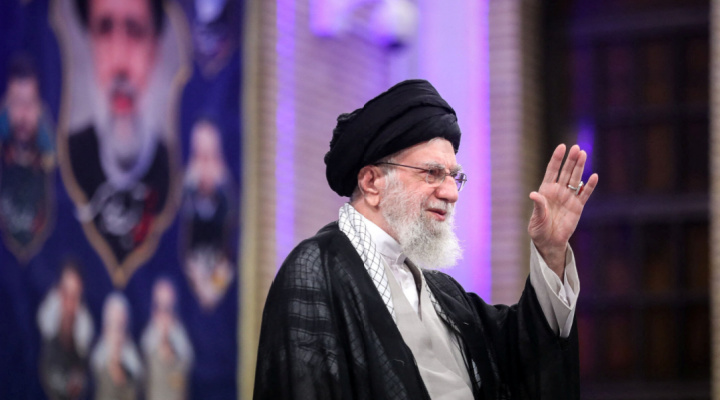Iran’s Supreme Leader Ayatollah Ali Khamenei waves during a meeting in Tehran, Iran, May 20, 2025. Photo: Office of the Iranian Supreme Leader/WANA (West Asia News Agency)/Handout via REUTERS
For years, Western commentators have wondered aloud why the vast resources of Israel’s public diplomacy efforts — Hasbara, as it’s often called — have so consistently fallen flat — earnest explainer videos; carefully captioned infographics; appeals to reason and international law. All are tragically ineffective when faced with an enemy that thrives not on truth, but on narrative — and whose audiences see weakness not as a prompt for sympathy, but as an invitation to strike.
But something has shifted. Quietly, almost accidentally, a far more potent weapon has entered the battlefield: mockery. Not just commentary or explanation — but relentless, humiliating, viral ridicule. Suddenly, Iranian officials are being memed into irrelevance. Their threats turned into TikTok soundbites. Their propaganda met not with a counter-lecture, but a clown nose.
And it is working.
Because while the Islamic world has long postured around the notion of honor, there is one thing that has always cut deeper than military failure: public humiliation. Regimes can survive defeat. They can survive sanctions. But they do not survive becoming a joke.
Look back to 2009, when protestors in Iran chanted “Where is my vote?” after the stolen election of Mahmoud Ahmadinejad. What did the regime fear most? Not the demonstrations — those were violently suppressed. It was the Twitter hashtags, the jokes about their fake democracy, the collapse of the regime’s dignity in the eyes of their own people.
Dictatorships cling to power through fear. But fear only functions so long as people believe in the myth of strength. Once that illusion is broken — once a regime is laughed at — the spell is broken. The emperor has no clothes, and worse, he has been turned into a meme with auto-tuned music and poor subtitles.
Which brings us to today. Israel, long accused of losing the PR war, has begun to win it in a most unexpected fashion. Not by out-explaining. Not by out-arguing. But by out-mocking.
The Islamic Republic of Iran has just watched its crown jewel of nuclear secrecy, the Fordow facility, get flattened — and what’s circulating online? Not solemn analyses. Not Security Council resolutions. But a thousand perfectly timed TikToks with dancing soldiers, laugh tracks, and slow-zoom edits of confused ayatollahs. One could almost feel sorry for them — if they hadn’t brought this all upon themselves.
This isn’t just cultural pushback. It is psychological warfare at its finest. Because terrorism — and its state sponsors – rely on a performative narrative. They need to be feared. They need to be taken seriously. A suicide bomber is only powerful when framed as tragic, not idiotic. A supreme leader only commands loyalty when he’s seen as divine, not daft.
And so, for once, the West — and particularly Israel — has grasped a crucial truth: mockery is deterrence. Not instead of military action, but in tandem with it. A drone strike may eliminate a general. A meme may eliminate a myth. It is, in its own way, the most subversive act imaginable: to make the tyrant funny. To expose the man behind the beard. To show that the most feared actors in the Middle East can, with a few edits, become as ridiculous as a washed-up villain in a low-budget film.
The Hamas leadership in Gaza must face similar humiliation. Their battle cries turned into Instagram reels. Their martyrs repurposed as cautionary punchlines. It is not for naught that we have seen the rise of the comedic Jewish influencer, the one able to infantalize their moral superiority.
There is, of course, danger in this. Satire must not replace strategy. The West cannot meme its way out of hard decisions. But it would do well to remember that strength is not just about military power. It is also about psychological dominance — about never allowing the enemy to believe they have the upper hand in narrative, identity, or dignity.
Israel, for all its previous struggles in the digital battlefield, may have stumbled into something revolutionary. By embracing the power of mockery — by mocking the mullahs, the militias, the martyrdom cult — it has begun to rob them of their most precious asset: fear.
And as history has shown us, regimes can survive almost anything.
But ridicule? That’s fatal.
Meira Cowland Kolatch is a political commentator, international speaker, host of the podcast The Meira K Show, and founder of Young Voices for Israel. www.MeiraK.com
The post The Mullahs Can Survive Bombs — They Can’t Survive Memes first appeared on Algemeiner.com.
Click this link for the original source of this article.
Author: Meira Cowland Kolatch
This content is courtesy of, and owned and copyrighted by, https://www.algemeiner.com and its author. This content is made available by use of the public RSS feed offered by the host site and is used for educational purposes only. If you are the author or represent the host site and would like this content removed now and in the future, please contact USSANews.com using the email address in the Contact page found in the website menu.








